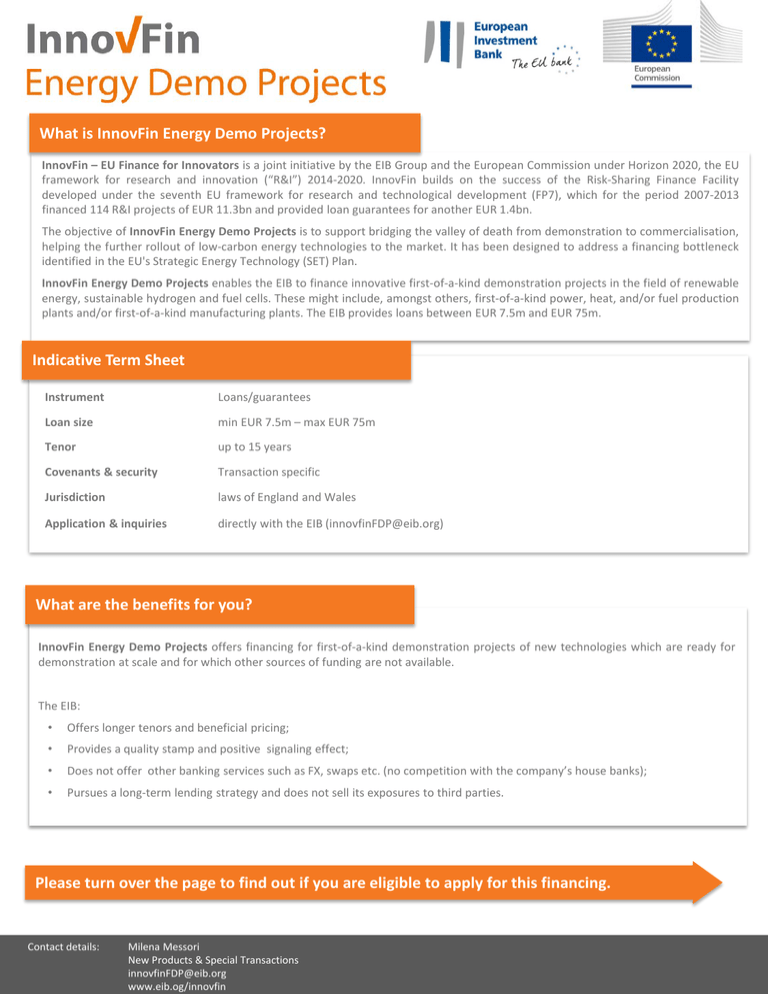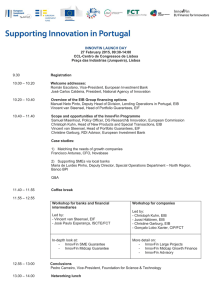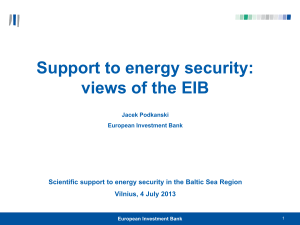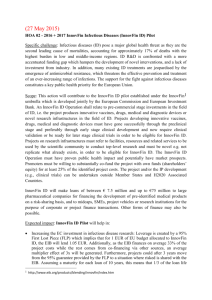What is InnovFin Energy Demo Projects?
advertisement

What is InnovFin Energy Demo Projects? InnovFin – EU Finance for Innovators is a joint initiative by the EIB Group and the European Commission under Horizon 2020, the EU framework for research and innovation (“R&I”) 2014-2020. InnovFin builds on the success of the Risk-Sharing Finance Facility developed under the seventh EU framework for research and technological development (FP7), which for the period 2007-2013 financed 114 R&I projects of EUR 11.3bn and provided loan guarantees for another EUR 1.4bn. The objective of InnovFin Energy Demo Projects is to support bridging the valley of death from demonstration to commercialisation, helping the further rollout of low-carbon energy technologies to the market. It has been designed to address a financing bottleneck identified in the EU's Strategic Energy Technology (SET) Plan. InnovFin Energy Demo Projects enables the EIB to finance innovative first-of-a-kind demonstration projects in the field of renewable energy, sustainable hydrogen and fuel cells. These might include, amongst others, first-of-a-kind power, heat, and/or fuel production plants and/or first-of-a-kind manufacturing plants. The EIB provides loans between EUR 7.5m and EUR 75m. Indicative Term Sheet Instrument Loans/guarantees Loan size min EUR 7.5m – max EUR 75m Tenor up to 15 years Covenants & security Transaction specific Jurisdiction laws of England and Wales Application & inquiries directly with the EIB (innovfinFDP@eib.org) What are the benefits for you? InnovFin Energy Demo Projects offers financing for first-of-a-kind demonstration projects of new technologies which are ready for demonstration at scale and for which other sources of funding are not available. The EIB: • Offers longer tenors and beneficial pricing; • Provides a quality stamp and positive signaling effect; • Does not offer other banking services such as FX, swaps etc. (no competition with the company’s house banks); • Pursues a long-term lending strategy and does not sell its exposures to third parties. Please turn over the page to find out if you are eligible to apply for this financing. Contact details: Milena Messori New Products & Special Transactions innovfinFDP@eib.org www.eib.og/innovfin Pre-screening and eligibility checklist Eligibility Criteria Eligible counterparties shall comply with the following criteria: 1 ☐ a. The project/investment should be in the renewable energy, sustainable hydrogen or fuel cells sectors. ☐ b. Innovativeness: i. The project/investment shall demonstrate for the first time the commercial viability of pre-commercial technologies. ii. Technologies should be innovative and not be commercially available yet. ☐ c. Replicability i. The project/investment has the potential to be replicated elsewhere with convincing market opportunities. ii. The project/investment should offer prospects for cost-efficient C02 reduction both in the EU and globally. ☐ d. Readiness for demonstration at scale i. The project/investment should be sufficiently mature for demonstration at the proposed scale (technologies validated and demonstrated through previous testing) with reasonable prospects of successful demonstration. ii. The proposed scale of demonstration should be equal to that of future commercial applications or be such that no significant additional problems are to be expected. ☐ e. Timeline i. At the time the project/investment is included under the facility, the projected start of commercial operation of the whole plant is expected to happen within a period of maximum 4 years. ☐ f. Prospects of bankability i. The project/investment shall have the potential to be or to become bankable by the guarantee release date. ii. This requirement relates to all aspects of the project/investment that are relevant for future project performance and debt service. ☐ g. Commitment i. Promoters, sponsors and/or operators must be willing to substantially co-fund the project. Eligible counterparties shall comply with each of the following eligibility criteria: 1. The counterparty shall not be a “firm in difficulty” within the meaning of Article 2.1 of the Community guidelines on State aid for rescuing and restructuring firms in difficulty (OJ C 244, 1.10.2004, p. 2.), as amended, restated, supplemented and/or substituted from time to time(prolonged OJ C 296, 2.10.2012, p.3); 2. The counterparty shall not have a substantial focus on one or more Restricted or Excluded Sectors (which determination shall be made by the Bank in its discretion based, without limitation, on the proportionate importance of such sector on revenues, turnover or client base of the relevant counterparty); 3. The counterparty shall be established and operating in one or several of the EU Member States and Associated Countries(Iceland, Norway, Albania, Bosnia and Herzegovina, Former Yugoslav Republic of Macedonia, Faroe Islands, Israel, Moldova, Montenegro, Serbia, Turkey); Excluded Activities: 1. production (or construction) of, distribution (or processing) of, and trade in weapons and arms, ammunition, military or police equipment or infrastructures, and equipment or infrastructure which result in limiting people’s individual rights and freedom (i.e. prisons, detention centres of any form) or in violation of human rights; 2. production (or construction) of, distribution (or processing) of, and trade in gambling and related equipment; 3. production (or construction) of, distribution (or processing) of, and trade in tobacco products; 4. activities involving live animals for experimental and scientific purposes insofar as compliance with the "Council of Europe’s Convention for the Protection of Vertebrate Animals used for Experimental and other Scientific Purposes" cannot be guaranteed ; 5. activities which give rise to environmental impacts that are not largely mitigated and/or compensated; 6. activities considered ethically or morally controversial or which are forbidden by national law, e.g. research on human cloning; 7. pure real estate development activity; 8. pure financial activities e.g. purchasing or trading in financial instruments. The exclusion and eligibility criteria shall be met at the latest at the time of approval of the EIB loan. 1 Projects in the fuel cells sector shall either (1) aim to support or enable the use of renewable energy (directly through the use of renewable energy sources or indirectly through an improved integration of renewable energy into the energy system), or (2) contribute to an increase of energy efficiency and/or emissions reduction. In projects focusing on hydrogen production/distribution, the hydrogen should come primarily from renewable sources (including but not limited to biogas, biomass, electricity produced from RES, direct production from sunlight, etc.).


